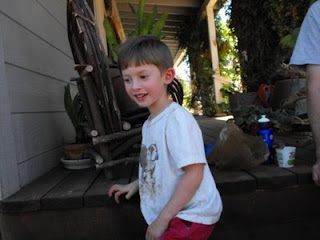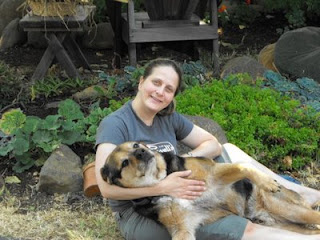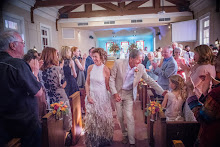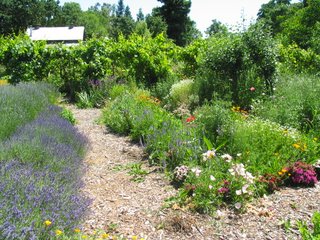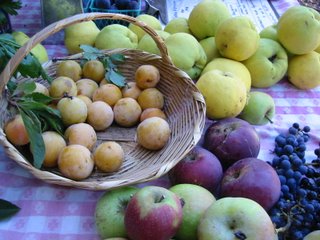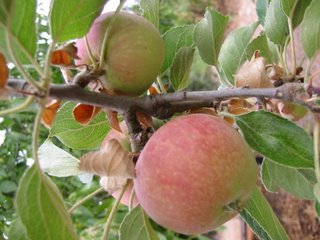Slow Sonoma
Slow Sex
Slow Life
Slow Food
Awakened Life
Truth in all things
See Also, the New Main Blog: Poems From Now/ PoemsFromNow.com


Monday, July 28, 2008
Saturday, July 26, 2008
what is a life?



Wenonah, daughter, and new friend, Oscar, dog

me in some silliness

Neighbor Terri and cactus friends gave him ten years ago

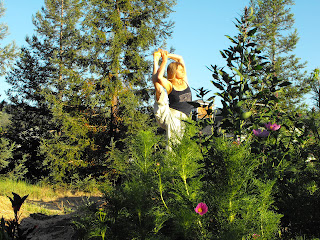
Marlie in the garden we made,
and is growing
day by day
a life
lived in the moment
could be like this:
this moment is interesting
and
now
this moment is interesting
and
now
this moment is interesting
for some speculation
on tai chi
and chi gung
and various ideas
of "tucking the tailbone under"
sooner of later,
there
will be an batch of thoughts,
not too many really,
you explore
and discover for yourself
at
Thursday, July 24, 2008
love and not love


say your partner picks
at your food
when you are eating together
and it
"drives you crazy"
you could say:
this bothers me
you could say:
this is fun
you could say:
i love you doing something
that drives me crazy
you could ask:
could you stop
and then we then
don't
love
that
love
is something like this:
what you do
is so sweet and charming
to me
sometimes even
more
when you do things
"I" don't like
and is the "I" who
doesn't like
what other people
are up to
the real
me?
Labels: emptiness and love, love is ..., love is now
Wednesday, July 23, 2008
stretching, a new word for self-attacking

Marlie at work in the garden
just wanted to try a high resolution photo
and see if it made
any difference
???
what do you think?
Stretching:
we can expand
out
and we can release extra effort
and
we can
get clear about possibilities
and then
there
is
"stretching"
such a sweet,
deceptive
sado/masochistic ritual
in yoga and athletic "warm ups"
not always
but usually
stretching
is pulling
and yanking on
ourselves
this seems
unkind
to me
what do you think?
bigger essay
at The Seduction of Stretching
Labels: starting ideas, stretchin, Wednesday essays and rambles
Monday, July 21, 2008
hello good morning yes fog life Monday, hmmm




well,
thought i should get a pic a little older than
the one i've been displaying,
that one in my 50's,
now i'm a sog glog senior cit
ha
how
the time
isn't real
and some hair gets
grey
and more wrinkles
come
ohmygod
how fun
you know
it's all pretty easy
the enlightenment
thing:
just love everything
grey hair
so called mistakes
times i'm not so wonderful
times i'm wonderful
times i'm quiet
times i'm a fool
love all around me
times
they are fools
wonderful
weird
uninterested in wonderful me
have opinions about wonderful me
that are not flattering
are asleep
are awake
are happy
are sad
are in a rush
are slow
and
so on
just love it all
and be silent and calm
and pleased with it
and if that's not the trip
either "just shift"
or
do the Work
or maybe just go take a walk
and come on back
into
Reality
Labels: life is good
Friday, July 18, 2008
friday is sweet, love you now

and around here,
this was blooming
in sweet landlady Kathi's garden:

today's essay
at tai chi yoga health blog
have a wonderful day, it's good for your health
Labels: flowers, Friday essays, happiness is who we really are, health, Marlie is wonderful, marv marl, wonderful day
Wednesday, July 16, 2008
Wednesday a movement lesson

Marlie up to the usual
at our new place
as per new deal
the Wed ramble over at
http://wakeup-feldenkrais.blogspot.com/
click here to peruse
today's essay
and movement
activity
if you want to enjoy
and learn
and see
what you can gather for
the sweetness
of your life.
Monday, July 14, 2008
Who was Moshe Feldenkrais?
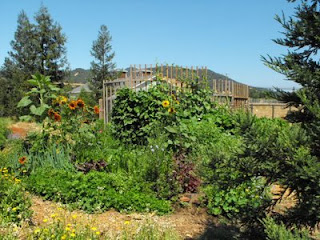
Finally got another camera and here's some beginning
tastes of our garden.
The dude lived from 1904 to 1984, which places him among the dead.
Some think he was a genius.
Here's what I wrote about him recently:
"And who was this Moshe Feldenkrais? Well, he lived from 1904 to 1984. He was born in an area of Poland, walked off at fourteen to Palestine, re-started life there as a laborer, and a tutor, and progressed in his life to achieving a Doctorate of Science from the Sorbonne in France and inventing a system of healing and change and brain rewiring that has help thousands throughout the world.
Helped whom?
Musicians, actors, skiers, golfers, high performance folk of all sort. And children with special needs such as cerebral palsy and autism. And folks who are finding themselves annoyed or worse with painful shoulders, backs, necks, hips. People recovering from surgery. And upgrading their movement and brain and whole self enough sometimes not to need surgery.
And back to Moshe Feldenkrais.
This was a man who was a physicist, and an engineer. A man who studied the martial arts as a young man in Palestine in the 1920’s, the study and pursuit of which led to his being the first European to become a black belt in judo in Europe in the 1930’s. He loved sports, and his overzealous love of soccer led to knee injuries. Working on submarines in England during World War II, he encountered slippery surfaces which aggravated his knee injury to the point he asked about surgery.
When the doctor of the time told him they could try, but his chances of walking after would be 50%, Moshe said he could flip a coin for those odds, and proceeded to invent a whole new way of “body work,” that turns out to be brain work.
He drew on judo, and its awareness of efficient action centered in the power of the pelvis and the freedom of the head to look always easily in all directions. He drew on anatomy and physiology. He drew on his pediatrician wife’s access to children to study closely how human nervous systems learn to move from scratch, and how, interestingly enough, the moves of infants and toddlers, are often those “discovered” to be most efficient and useful in judo.
And this is core to remember: babies have to learn it all. Luckily adults can't really teach them to crawl and walk, and there is no crawling and rolling over and lifting the head and walking program. It's all learned.
He drew on the concepts of engineering: how is our body engineered as an organism that can do all the things it can do. (Hint: two legs maximizes instability, which maximizes mobility.). He somewhat discovered cybernetics, not in terms of computers, but in terms of getting very clear how our brains give us feedback which modifies our movement which gives the brain more feedback and so on, as we learn and refine.

He also studied a mystical and practical philosopher named George Gurdjieff, who defined the plague of humanity as being our being “asleep,” asleep to the present moment, asleep to what we are really doing, asleep to our lies about ourselves and our motivations, asleep in living a life almost entirely of habit.
Moshe could see that some habits were useful and time saving learning: how to tie shoes.
He also got very clear that some habits were learning that serves to keep us blocked and limited and often in pain, say the habit of clenching and holding our breath and curling forward when confronted with something “strange,” or something we “can’t do.”
(Can’t do, YET, is one of the big mottos in the Feldenkrais work.)
And most of all, Moshe Feldenkrais studied himself, trying this, trying that, deeply and thoroughly, learning again what toes were and ankles and knees and hips and pelvis and ribs and spine and head and eyes and tongue and mouth and shoulders and breathing and skin and rolling and sitting and walking and falling and balancing and hopping.
You know, like everything.
All over again, a fresh babe, unable to walk, wanting to function superbly again.
And he succeeded. His knees remained shot, no surgeon ever "helped" him, and he could lead groups of hundreds of people for hours on end, and do judo again, in his seventies.
This took many years, but curiosity and discovery kept leading to more curiosity and more discovery.
And if the books said it was this way, and he discovered a way they said was impossible or wrong, he went with the truth of what worked and connected for him.
So, he ended up with a system that pretends to be “body work” and is really “brain work.”
Don’t believe me. Go back to the pelvic clock or the twisting activities and do them slowly enough, and notice how shifts and learning is taking place not only in your body, but your brain.
Sometimes Moshe Feldenkrais called his work, “learning how to learn.”
Sometimes he liked to see it as a transformational tool for life as a whole, where in small and big movements, and then is larger areas of our life we could do this, another motto: Making the impossible to be possible, making the possible to be easy and then making the easy to be elegant.
So that’s a start.

If you made it all the way here
and can stand more,
this is what I wrote a couple of years
ago (August 29, 2006):
Who was Moshe Feldenkrais?
Labels: asleep, discovery, learning to learn, Moshe Feldenkrais, not waking up
Friday, July 11, 2008
Friday essay, bee sting
the glories
of treating a bee sting
with love
and curiosity
and even learning
about my thumb while
at it
is,
as the new habit
over at Tai Chi Yoga Health Weight Loss Etc
blog
Labels: Friday essays
Wednesday, July 09, 2008
Wednesday ramble
on Creating Pathways to Change
as per new habit
at Brain Plasticity, Learning and Love
bloggeru
the "new habit"
being
each Wednesday
i'll do a brain plasticity
learning to move better
or be more creative
or heal in the learning and awaring
mode
at the above blogsite
Labels: Wednesday essays and rambles
Monday, July 07, 2008
Monday ramble: new thinking via new approach
From now on,
an essay will come to slowsonoma.com
each Monday
and an essay to WakeUp-Feldenkrais.blogspot.com
aka Brain Plasticity, Learning, Love and Vitality
on Wednesdays
and an essay
to Tai Chi / Yoga / Health / Weight Loss / Everything
on Fridays
sometimes
the "essay"
will be more a poem
sometimes
an "essay"
sometimes a bunch
of questions
hope you'll come by and visit
here's today's "essay"
THINKING IN A NEW
MODE
Most of us don’t think.
We have a bunch of words running in our heads, often rehearsals of something we plan to say ( and usually don’t.). Sometimes we replay old conversations and give ourselves better lines. Again, sadly, we often spend our mental chatter time complaining about someone, often the person we live with, and hopefully we don’t get around to dumping this load, but even if we don’t, what a waste of a mind.
And then sometimes we think radically true thoughts:
I am alive.
Or,
I have not been aware for the last couple of hours.
Or,
I didn’t need to say what I just said.
Or,
This isn’t working, what else can I try.
Or: This isn’t working, how can I slow down and observe what I’m doing to learn a more useful and effective and easy way to go about this.
Or,
(This close to the first one) I’m going to die someday. Is this really how I want to be using my time and energy and thinking and emotions?
And more.
Later, I’ll have a chapter full of possibly useful or life opening questions to mull in a day, or in a life.
For now, though, I have a proposal.
Let’s go about thinking in a way that the movement activities are actually encouraging and developing: thinking without words.
You’ve had the experience. Suddenly a thought, an answer, an insight just pops into your mind. It’s about something that’s been troubling or fascinating you, but you really haven’t been grinding away at the “issue.” You were doing “something else” when the newness of real thought popped into your mind.
So, today, let’s go about this.
Get a couple of sheets of paper. Look at the first blank page and allow your mind to be as still as possible.
Then, allow yourself to write down four or five words that you would really like to think about. Love. Fear. Freedom.
Many, many more.
Just single words and no more than five.
Write them down, and look at them and follow your breathing and do a little bit of a pelvic clock and have as few words as possible in your mind.
Then, circle one word.
Don’t think. Just pick.
Now, write that word on a new blank piece of paper. Look at it, again, sensing yourself, following your breathing and doing a little arching and folding of your back as you look.
Have an empty mind, as if silence is a vast field of quiet wisdom there just for you to dip into and mine.
Breathe.
Relax.
Don’t think.
Look at the word.
Look away into the distance.
Wiggle side to side.
Get up, walk around. Look at the word.
Turn over the page, forget the word, and go take a walk, again with the walk to be a time to be wordless. Walk and watch. Walk and breathe. Walk and notice your feet touching the ground. Walk and notice light coming in your eyes. Walk and notice sounds coming in your ear.
Come back to your paper. Look at the word once more and start to write for a couple of pages, without stopping, or “thinking,” or punctuating anyway other than what comes easily, about this word.
Let the words and images and ideas just pour out.
Do that until a couple of pages are full.
Take another walk.
Come back, do NOT yet read what you’ve already written, but check in with your intuition and see / feel/ guess if anymore words want to come out. If they do, spill them on out.
Then rest a bit. Or walk.
And then read what you’ve written, and decide if this “thinking” can lead somehow to some wonderful, even if ever so slight, shift or change or improvement in your life.
Labels: fun, improvement, loving life, real thinking, waking up, walking
Sunday, July 06, 2008
Independence, learning, life and love
the 4th of July
is over
thank
goodness
i love a parade
and
fireworks
and
a crowd
and a bunch
of people
having a "good time"
and still,
i'm glad it's over
does
4th of July
have something to do
with Freedom
with
Independence
and what would these words mean
in our lives
and in our being
if we didn't just spout
them
now,
around the world
there are repressive regimes
and our is better than most
for most people
and still:
what would real
freedom
mean?
when someone says something
we don't like:
what would freedom be
inside ourselves
when everyone else is doing
something
and wants us to join
and we don't really want to
what would freedom really
look like
when we always put the same
leg in our pants
first
and don't know that
when we go from sitting
to standing
and don't know how we do that
when we hold our breath
hundreds of times
a day
and don't know
that
what would a free life
be
as a being who
moves and thinks
and lives in society
????
those a questions.
what would it be like to have
more questions in our life?
what would it be like
to be okay
with "I don't know"
as a way of being
in a few
or many situations
not clueless,
but curious
really wanting to
understand:
who am I?
what is going on here?
how can I contribute to making it better?
and the great slavery:
the approval and disapproval
of others,
which the Work of Byron Katie
is so useful in
transforming the terror of the situation
into
humor
lot's of ways of
becoming more free.
try desk trainer,
link to right.
try the movement classes coming up,
learn how many more and delightful
ways you could move and be
go into silence
when your "it"
your conditioned
me conditioned
our conditioned
robot person
is screaming to let loose the same
old
same old
lots
of ways
and one
way:
start
to learn
how to think
we all think
we know how
to think
because we have words in
our head
but what would
real thinking,
free thinking,
independent
(which doesn't have to be some stereotypically defiant mode)
thinking
be?
lots of not know
and to be
on the way
to discovering
eh??
Labels: " the work of Byron Katie, "i don't know, freedom, real thinking
Thursday, July 03, 2008
slowing down, part twelve
SLOW DOWN
Like how fast we are driving?
Like how fast we are talking?
Like how fast we are eating?
Like how many things we are doing?
Yes.
And even better, spend a day not being in any cars.
And talking less than usual, say letting the phone kind of take care of itself, and letting other people talk, but not feeling compelled to tell them all our brilliant and wonderful ideas.
In keeping with that, I won’t tell you a bunch of wonderful ideas about the slow food movement, or just the slow living movement, or any of that.
You are smart enough to be curious about what would this day be like if you took plenty of time between things to sit and do nothing. Or sit and contemplate what you’ve just learned and experienced.
To sit and sense yourself.
To lie down on the floor and try the day one activity, the pelvis clock.
To sit in a chair or on a log and try the pelvic clock.
To sit anywhere and follow your breathing and have an empty mind and see if you can allow to percolate up in you what you really want to be doing next.
Yes, yes, of course you have your obligations, and a little slowing and not rushing off might surprise you about how much or little you really want to do the next thing that is on the “to do” list.
What would it be like to be present in our transitions from one activity to another?
What would it be like to not know for awhile, or even for big patches of time, what we are going “to do” next?
What if we veered off on a walk, or a stroll, or a roll around on the ground, or a roll in the hay, or took a nap?
Would the world fall apart?
Who knows?
What will we discover when we slow down to the level of life lived in the present moment?
Who knows?
You will, if you do it.
Danger, though: this could become a habit, and a very pleasurable and life shifting one, at that. Ah, well. That wouldn’t be so bad, would it?
la, la
Labels: fun, less is more, slowing down, transformation, what would real thinking be?
